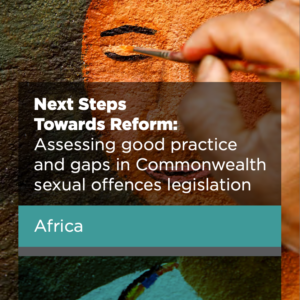Mauritian criminal law is derived from the French Penal Code and British common law, particularly on criminal procedure and evidence. Sexual offences are found in the Criminal Code 1848, as amended. The Child Protection Act 1995 (CPA) contains some child sexual offences, one of which is relevant to this research.
The CC is, in many respects, outdated and does not reflect good practice. In 2007, the government prepared a Sexual Offences Bill to update these provisions, but it had not been enacted at the time of writing. The government has since stated it is committed to updating the CC and criminal procedural rules to reflect developments in the Commonwealth, and authorised the Mauritian Law Reform Commission to develop amendments in these areas.
The Mauritian Law Reform Commission has made numerous recommendations, at least since 2007 and again in April 2019, for the reform of the sexual offences provisions in the CC. For example, in 2007 it recommended that consensual acts of ‘sodomy’ committed in private by adults be decriminalised in accordance with international human rights standards. In 2016 it made further recommendations and in 2019 it presented draft provisions to replace the existing law. As of October 2023, Mauritius no longer criminalises same-sex intimacy as a result of a Supreme Court decision rendering the ‘sodomy’ offence unconstitutional insofar as it applies to consensual intimacy between men in private. The Criminal Code has not yet been updated to reflect this development, and consequently the word ‘sodomy’ still appears in the text.
Mauritius is a state party to relevant international and regional human rights treaties, including the Convention on the Elimination of all Forms of Discrimination against Women, Convention on the Rights of the Child, Convention on the Rights of Persons with Disabilities, Convention against Torture and Other Cruel Inhuman or Degrading Treatment or Punishment and International Covenant on Civil and Political Rights. Mauritius is also a state party to the African Charter on Human and Peoples’ Rights and the Protocol to the African Charter on Human and People’s Rights on the Rights of Women in Africa (Maputo Protocol).
Read more about the criminalisation of LGBT people in Mauritius.
The full assessment of Mauritius is available here.



